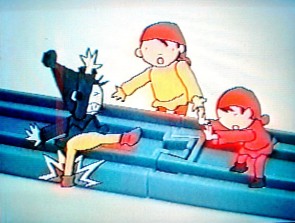RENFE 'Pato' - Valencia, Spain
10 Replies, 11515 Views|
I am always amazed at the different engineering for aerodynamics there are. Thats a very low and long nose. Is this a new train?
Thats a very low and long nose. Hence the name 'Pato' (= duck)
Is this a new train? By no means. The first units entered operation in 2005. Pay particular attention to the wheel arrangement. These trains are known for their unconventional articulated passenger coaches. The wheels are mounted in pairs but not joined by an axle and they are between coaches rather than underneath individual coaches; there are only two wheels per coach. More here. Similar rakes of coaches are used by RENFE on trains hauled by electric locos. Some are able to switch gauge while in motion between AVE (high speed) standard gauge and regular Spanish broad gauge lines.
Thanks Chrisjo...lol, the duck.
Those sure are different ideas for sure. The 'Variable gauge' sure is innovative and would surely be of help so the train can also utilize existing tracks rather than the initial expense of building entire systems to accommodate the high speed train. I am curious as to how the passengers feel anything with the 'Natural tilting' movement or is it made for them to feel less.
I wonder if the “duck bill” is done for same reason as the various long nose Shinkansen designs? Basically, to reduce the effect of air compression in tunnels and the resulting boom or thump as the train exits.
Good point OTR. I never thought about what sound a high speed train would create when blasting into an entrance to a tunnel. I would think that some of Japans Shinkansens noses would be as slim if it weren't for the retractable couplings like the E5's and 6's.
OOP's
The coupling in the picture doesn't seem functional as the noses look too close together to maneuver curves without bumping at least that is what it looks like to my amateur engineering mind. |
Users browsing this thread: 1 Guest(s)


![[Image: DSC03820.jpg]](https://i.postimg.cc/Hr3S8Mc6/DSC03820.jpg)
![[Image: DSC03830.jpg]](https://i.postimg.cc/94ZYtqr3/DSC03830.jpg)
![[Image: DSC03821.jpg]](https://i.postimg.cc/K3kzBt8B/DSC03821.jpg)
![[-]](https://www.blueplastictracks.org/images/collapse.png)

![[Image: Untitled.png]](https://i.postimg.cc/XG4ZPk5N/Untitled.png)
